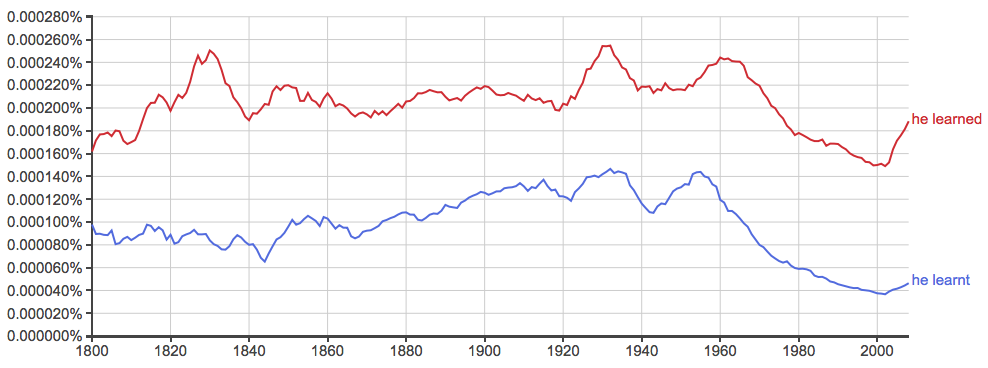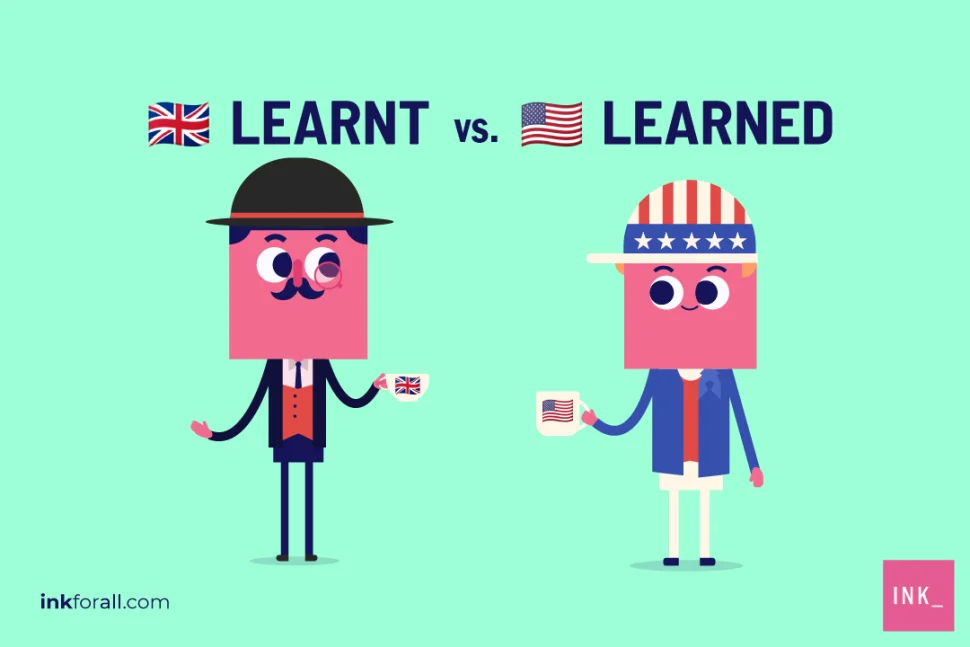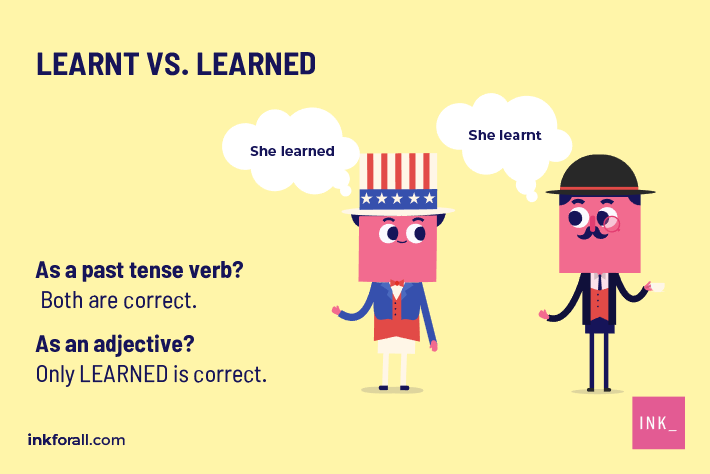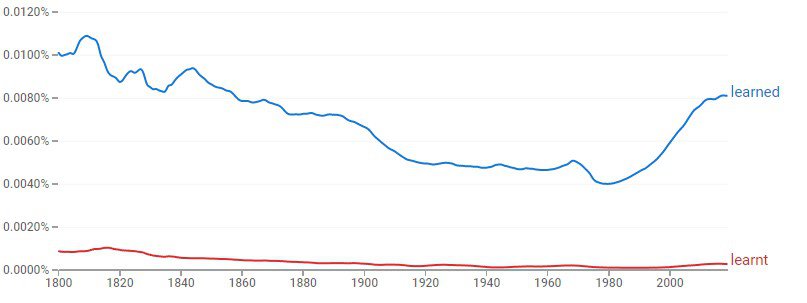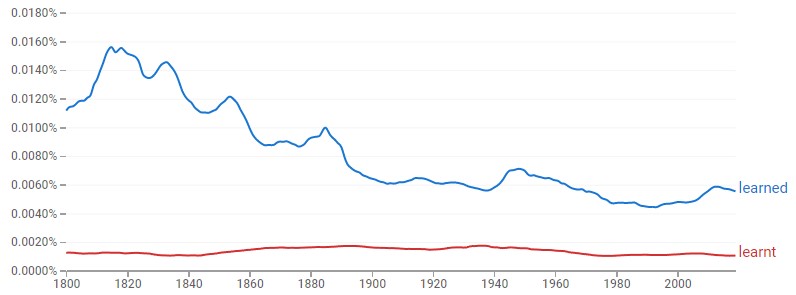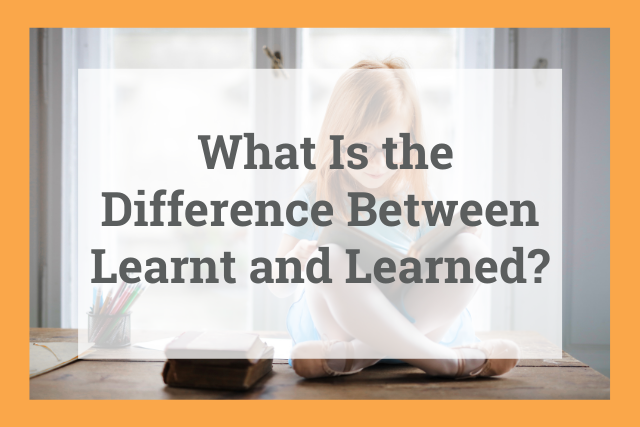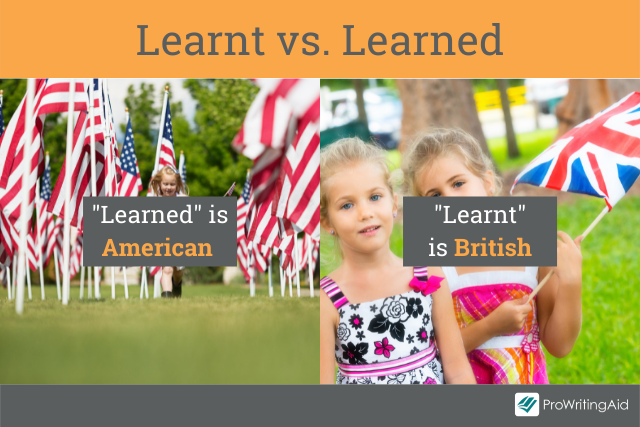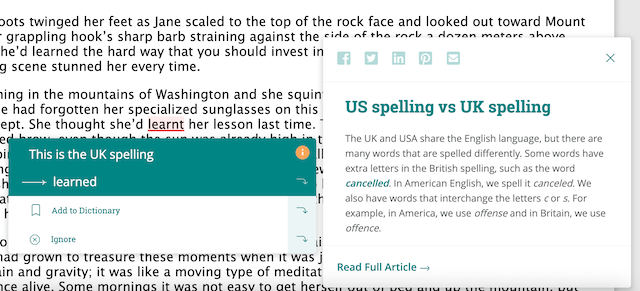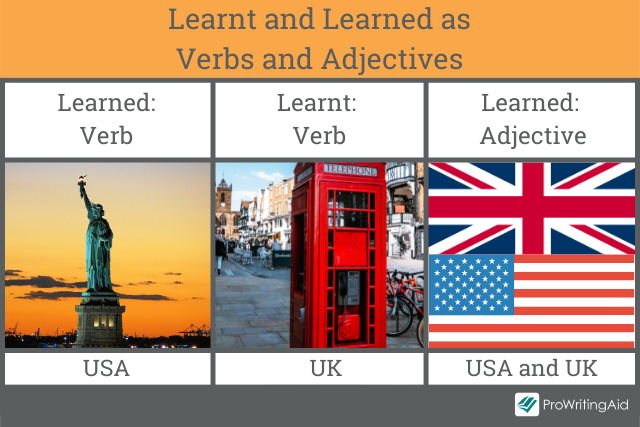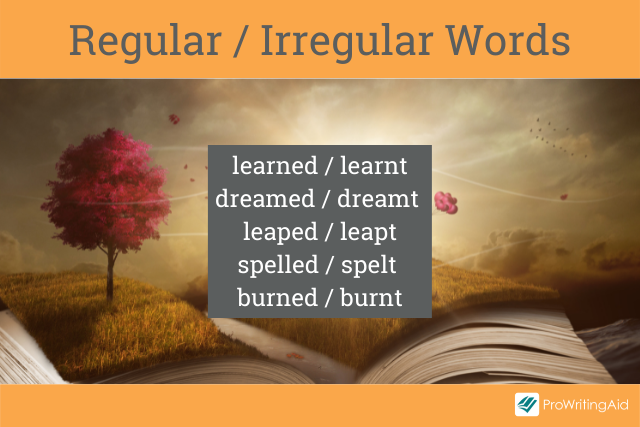Many words are spelled differently in American and British English, even if they fulfill the same function in a sentence.
Learnt and learned are two different spellings of the same verb. One is accepted in British English, but not in American English.
Depending on where you are writing, you might choose learnt or learned. But, which is it?
Continue reading to find out.
What is the Difference Between Learnt and Learned?
In this post, I will compare learnt vs. learned. I will use each spelling in an example sentence to demonstrate its proper context. Plus, I will show you a mnemonic to help you decide whether you should use learned or learnt.
When to Use Learned

As an adjective, learned is a synonym of knowledgeable and sometimes describes to a person who is highly educated. The sentences below demonstrate the usage of learned as an adjective.
- The learned astronomer told me that Pluto is not a planet, but I will always disagree.
- When I became a learned man, I saw the world in a different way.
As an adjective, learned is pronounced with two syllables. The first syllable is stressed, much the same way as the word perfect (ler-ned)
Of course, learned is also the past tense form of the verb learn, which means to acquire knowledge. See the following sentences for examples.
- When I was young, I learned to ride a bicycle.
- The snowman learned not to spend too much time in greenhouses.
- Thone introduced her to roller skiing about 12 years ago. He had learned about it from other coaches and elite Nordic skiers, who were using it for off-season training. –The Wall Street Journal
When to Use Learnt
What does learnt mean? Learnt is an alternative spelling of the same word. It rhymes with burnt. It is only used as a past tense verb, and only in British English, like in these sentences:
- “My big brother learnt his math at Cambridge,” the little orphan boy lied.
- Fifty years ago he used a fairly minor motorcycle accident as an excuse to step away from the spotlight. But the end of the “perfect” Dylan – the one who fused what he had learnt from Woody Guthrie and the symbolist poets with the energy of rock’n’roll, and who mocked the world from behind impenetrable shades – did not mean the end of his creativity. –The Guardian
As you can see in the chart below, which graphs the appearance of the phrases “he learned” and “he learnt” in British English books since 1800, learnt is less common even in that corpus.
This chart is not scientific or infallible, since it only tracks word use in books written in English, ignoring all other sources. Still, it helps visualize a clear long-term trend.
Trick to Remember the Difference

You should probably never use learnt. It is only common in British English as a past tense verb, and even in that context, it is overshadowed by learned.
In situations where you want to capture the way some speakers of English might actually talk, it could be helpful to choose learnt over learned. At all other times, choose learned instead.
You can remember to choose learned over learnt since learnt rhymes with burnt. Just like you wouldn’t want to eat a burnt cookie if there were other cookies available, you wouldn’t want to use learnt if there were other words available.
There is another word available; that word is learned.
Summary
Is it learnt or learned? Learnt and learned are variant spellings of the past tense form of the verb learn, which means to acquire knowledge.
- As an adjective, learned is the only appropriate spelling, and it is pronounced with two syllables.
- Learnt is more common in British English than American English but is still overshadowing by learned.
You should always choose learned, especially in formal writing. It is more common even as a British English verb, the one context where learnt is accepted.
You can remember to avoid learnt since it rhymes with burnt, and most people also seek to avoid things that are burnt.
Contents
- 1 What is the Difference Between Learnt and Learned?
- 2 When to Use Learned
- 3 When to Use Learnt
- 4 Trick to Remember the Difference
- 5 Summary
What is the difference between learnt vs. learned ?
If you’re learning English for the first time, the easiest grammar lesson to learn is that if a word has two spellings, it’s likely because of American English vs. British English. Learning the difference between learnt and learned is no different, although it appears to be a topic of hot debate.
The words learnt and learned are the past tense forms of the verb ‘to learn,’ which means ‘to gain or acquire knowledge.’ Both spellings are correct, but “learnt” is more common outside of the United States (and particularly in the United Kingdom).
The only time “learnt” is undeniably wrong is when “learned” is an adjective that describes someone as educated or smart. So, unless you’re trying to be ironic, avoid using “learnt” for descriptions.
Learned vs. learnt = American English vs. British English
The main differences in spelling between learned and learnt involve ‘standardized’ forms of the English Language. Dictionaries in the United Kingdom declare “learnt” as the standard spelling, while American dictionaries prefer “learned.”
Noah Webster, the co-founder of Merriam-Webster’s Dictionary, played a significant role in the standardization of American English in the early 19th century. The Word Counter covered similar spelling misnomers, including:
- Canceled vs. cancelled?
- Flier or flyer?
- Toward vs. towards?
Another confusing trait about learned vs. learnt is that “learn” is an irregular verb. An irregular verb is a word with different tense forms than you’d logically expect. For example, most verbs conjugate to past tense forms that end with -ed. Irregular verbs follow their own rules, though, and most English speakers have to memorize these tense forms early on.
Irregular verbs with similar spelling differences to learned vs. learnt include:
- Burned and burnt
- Dreamed and dreamt
- Dwell and dwelt
- Kneeled and knelt
- Leaped and leapt
- Spelled and spelt
- Smelled and smelt
- Spilled and spilt
- Spoiled and spoilt
Note how one form ends with -ed while the other ends with -t? Depending on geography and local dialects, English speakers may choose to use one verb form over the other. English speakers in the United Kingdom, New Zealand, or Australia tend to use the -t form of words, while Americans trend toward the -ed form (but not always).
There are instances in English when the -t endings always top the -ed endings. For instance, “sleeped” and “keeped” are incorrect versions of “slept” and “kept.” Additional irregular verbs with -t endings include:
- Build = built, not “builded.”
- Deal = delt, not “dealed
- Leave = left, not “leaved.”
- Meet = met, not “meeted.”
- Send = sent, not “sended.”
- Shoot = shot, not “shooted.”
- Weep = wept, not “weeped.”
The adjective “learned” is never “learnt”
It’s not uncommon for Americans to believe that “learnt” is informal or that it sounds
uneducated. The perceived informality is likely due to the adjective form of “learned,” which we use to describe someone as informed or expertly in a skill, study, or experience.
As an adjective, we can use the spelling of learned for the adverb learnedly and the noun learnedness, but we’d never use learnt for “learntly” or “learntness” (in the English Language, anyways). Therefore, it’s safe to say that we shouldn’t use “learnt” as an adjective.
Non-American English grammar guides take the adjective and verb spellings into account when deciphering the correct use of learnt vs. learned. For example, The ABC Style Guide (an Australian media group) states that either spelling is okay as long there’s no confusion between “learned” as an adjective and verb.
What does learned mean?
The word learned is an adjective and the past participle of the verb “learn,” which means:
- To develop a skill or knowledge of a subject through studying, observation, mentorship, or life experience; or,
- To teach someone a skill or subject (archaic).
Sentence examples with the verb learned include:
“Today, we learned about the solar system.”
“I learned how to speak French.”
“Have you learned your lesson yet?”
“He’s learned nothing.”
“She’s going to learn you to mind your own business” (archaic).
As an adjective, the word learned describes something as educated or acquired through learning. Similar terms include the adverb learnedly or the noun learnedness.
Sentence examples with the adjective learned include:
“Stephen Hawkings was a learned man.”
I wouldn’t call the class enlightened, but it is a group of learned students.”
“Constant apologizing is a learned behavior and response.”
“Some people develop learned helplessness as a coping mechanism.”
Synonyms
Verb: Absorb, assimilate, digest, discover, familiarize, grasp, hear, master, memorize, retain, understand.
Adjective: Academic, bookish, educated, erudite, esoteric, intellectual, knowledgeable, lettered, literate, polished, scholarly, well-read.
Antonyms
Verb: Disregard, forget, ignore, lose, miss, misunderstand, neglect, overlook.
Adjective: Benighted, dark, ignorant, illiterate, lowbrow, semiliterate, uncivilized, uneducated, unlearned, unscholarly.
What does learnt mean?
The word learnt is another past tense form of the verb learn, except it’s more common for British English. But unlike the word learned, British English doesn’t use “learnt” as an adjective to describe someone as educated.
According to the Cambridge Dictionary, British English only uses the word learnt as the past simple and past participle of learn. More specifically, the British definition of learnt conveys the act of obtaining or discovering information.
Sentence examples with the verb learnt include:
“I fear that I haven’t learnt much of anything.”
“There were many lessons learnt along the way.”
“She learnt a lot about the planet Venus.”
Synonyms
Ascertain, determine, discern, gather, gain, grasp, hear, master, memorize, pick-up, read, receive, see, study, uncover, understand.
Antonyms
Ignore, lose, miss, misunderstand, neglect, overlook, pass, release.
A brief history of learnt and learned
The words learnt and learned each come from the verb learn, which entered the English Language via Old English (circa 500 to 1100 CE). At the time, the Old English term leornian meant “to get knowledge” or “to study, read,” and “think about.”
English speakers of the 13th century used the verb learned to mean “teach,” but modern English speakers hardly use the verb in this form. According to Lexico, this archaic use of learned fell out of favor around the 19th century.
How to use learnt vs. learned in a sentence?
To use learnt and learned in a sentence correctly, it’s important to realize how both words are past tense of the verb “learn.” By itself, “learn” and “learns” occurs in the present tense, while the act of “learning” presides in past, present, and future continuous tenses.
The words learned and learnt represent the past participle of learn, so we only use them to actions of the past. More specifically, we use learned and learnt for the simple past tense and the present, future, and past perfect tenses.
<Simple past tense
The simple past tense describes any action that occurred before the present moment.
“I learned how to use Grammarly.”
“I learnt about the influence of American English.”
Present perfect tense
The present perfect tense describes actions that occurred at an unknown or indefinite past time.
“I’ve learned my lesson the hard way.”
“She has learnt much through BBC News.”
Present perfect formula: have/has + learned/learnt.
Future perfect tense
The future perfect tense describes future actions that will end before another future point.
“You will have learned English grammar by then.”
“By the time you reach middle school, you will have learnt basic grammar rules.”
Future perfect formula: will have + learned/learnt.
Past perfect tense
The past perfect tense (or pluperfect) describes completed actions that ended before another past event.
“Thankfully, I had learned how to use irregular verbs by then.”
“I was glad to hear that students had learnt to avoid common spelling errors.”
Past perfect formula: had + learned/learnt.
How to pronounce learned vs. learnt?
Another big difference between learnt and learned involves pronunciation and, believe me, it’s not as simple as you’d like it to be. Several online dictionaries feature different pronunciations of learnt and learned, and they appear to depend on user dialect, word form, and the word’s approximate definition.
How to pronounce learned as an adjective?
The adjective learned always contains two syllables, but it’s pronunciation changes by region. Americans pronounce learned as “ler-ned” or “ler-nid” (lɜːrnɪd), while British speakers say “lur-nid” (lɜːnɪd).
There appears to be one exception, however. According to Merriam-Webster’s Dictionary, Americans also pronounce the adjective form of learned with one syllable as “lurnd” (ˈlərnd, ˈlərnt). The single syllable seems confusing at first, but it makes sense when you realize that people use verb definition as an adjective. For example:
- “A learned man.” = learned (two syllables)
- “Learned behavior.” = learned (one syllable)
How to pronounce the verbs learned and learnt?
According to Lexico, English speakers tend to pronounce the verb learned with one syllable. Americans pronounce learned as “lurnd” (ləːnd), and British speakers pronounce learnt as “lurnt” (ləːnt). However, if an American said “learnt,” it would sound like “lernt.”
FAQs: Related to learned vs. learnt
Is learnt informal?
If you live in the United States or Canada, the word learnt might sound informal because it’s less common than learned. If you live in the United Kingdom, the word learnt is the formal past tense form of the verb learn.
Is learnt a valid scrabble word?
According to Merriam-Webster’s Scrabble Word Finder, learnt is a valid Scrabble word. In addition to learnt, you can play learn, learned, and learning with 83 playable words.
Test Yourself!
Ready to take your grammar skills abroad? Test how well you understand learnt vs. learned with the following multiple-choice questions.
- ______________ is the past tense of learn.
a. Learning
b. Learnt
c. Learned
d. A and B - For British English, “learnt” is the ______________ of learned.
a. Irregular form
b. Common form
c. Future tense form
d. Continuous tense form - What is the opposite of a “learned person”?
a. A person who likes to read.
b. Someone with a lot of knowledge.
c. A student in college.
d. A person that refuses to learn. - Which of the following is not an irregular verb?
a. Burned
b. Dreamed
c. Need
d. Smelled - Which of the following sentences uses “learned” or “learnt” incorrectly?
a. “I’m a learnt scholar.”
b. “He learned about Pokemon.”
c. “Harry learnt much at Hogwarts.”
d. “She’s a charming and learned diplomat.”
Answers
- C
- B
- D
- C
- A
Photo sources:
- Photo by Victoria Heath
- Photo by Element5 Digital
Sources
- Harper, Douglas. “Learn (v.).” Online Etymology Dictionary, Etymonline, 2020.
- “Learn.” Lexico, Oxford University Press, 2020.
- “Learned, learnt.” The ABC Style Guide, ABC, 2020.
- “Learned.” Cambridge Dictionary, Cambridge University Press, 2020.“Learned.” The Merriam-Webster.com Dictionary, Merriam-Webster Inc., 2020.
- “Learn•ed.” Webster’s New World College Dictionary, AP Stylebook, 2020.
- “Learnt.” Cambridge Dictionary, Cambridge University Press, 2020.
- “Learnt.” The Merriam-Webster.com Dictionary, Merriam-Webster Inc., 2020.
- “Learnt or Learned?” Lexico, Oxford University Press, 2020.
- “To learn.” Reverso Conjugation, Reverso-Softissimo, 2020.
Main Learnt vs. Learned Takeaways:
- Both learnt and learned are acceptable forms of the verb learn in past participle and past tense.
- Learnt is more common outside of North America, especially in British English.
- Wherever you are, when used as an adjective, only learnedis correct.
- Sometimes learned is used as an adjective, but learnt is always a verb.
What’s the Meaning of Learned?
As a verb, learned means that you completed the process of acquiring or retaining knowledge. It’s how we conjugate the verb learn in both past tense and past participle. However, as an adjective, learned describes a knowledgeable or well-educated person. You also pronounce learned differently depending on whether you use it as a noun or a verb. For example, learned the verb sounds more like one syllable while learned the adjective sounds more like two.
Let’s dig a bit deeper into this difference in pronunciation.
You don’t fully pronounce the second “e” when you use learned in reference to information previously acquired. You know you’re saying the verb correctly when the word sounds more like it only has one syllable.
Here are some examples of when you would use this pronunciation of learned:
Conversely, you emphasize the second “e” when you use learned as an adjective to describe a person. You know you’re saying the adjective correctly when the word sounds more like two distinct syllables.
Here’s an example of when to use this pronunciation of learned:
Learneddefinition:(verb) knowledge gained by personal experience or formal studies
Learntdefinition:(verb) knowledge gained by personal experience or formal studies
Learned definition:(adjective) scholarly; demonstrating, requiring, or characterized by learning
Learnt vs. Learned: Which one is Correct?
As a verb,both learned and learnt are correct. They both mean that you completed the process of acquiring or retaining knowledge. And, they are both accepted ways of conjugating the verb learn in past tense and past participle. Learnt is exactly the same thing, just the more common way of spelling the verb outside of North America. However, as an adjective, learned describes a knowledgeable or well-educated person. When used this way, only learned is correct, no matter your location. In short, you cannot use learnt as an adjective.
At the end of the day, you can typically use learnt or learned in a sentence without introducing a grammatical error. The only difference is that learned is more common in the U.S. and Canada, while learnt is often preferred outside of North America.
Interestingly, the -ed variant for past tense verbs is becoming more common in British English. That means learned may eventually replace learnt as the preferred spelling for English speakers in countries that use British English.
When used as verbs that indicate the past tense of learn, learnt and learned are interchangeable. But, you cannot use learnt as an adjective, as this function is reserved for learned.
How do you use Learnt in a Sentence?
You can use learnt any time you need the past tense of the verb learn. Let’s review some examples of learnt and learned in sentences.
In the sentences above, learned and learnt are interchangeable words. However, it’s important to remember you can only use learned as an adjective, not learnt.
You may have heard of learned behavior or learned attitude.
You can’t go wrong using learnt vs. learned as a verb, regardless of your location. Learnt is more common outside of North America, but it’s still an acceptable word for U.S. and Canadian speakers. You can even use it in Scrabble!
Test Your Learnt vs. Learned Skills With This Quick Quiz
Learnt vs. Learned Question #1
Correct!
Wrong!
The answer is TRUE. Both words function as the past participle and past tense of the verb «learn.»
Learnt or Learned Question #2
A. Noun
B. Verb
C. Adjective
D. Adverb
Correct!
Wrong!
The answer is B. “Learnt” is a verb that references a previous process of acquiring or retaining knowledge.
Learnt Question #3
A. Learnt can act as an adjective in a sentence.
B. Both learnt and learned are grammatically correct.
C. Learned is commonly used in the U.S. and Canada.
Correct!
Wrong!
The answer is A. You can only use learned as an adjective in a sentence.
Learned Question #4
A. Jane learned how to play the piano within a month.
B. Jane learnt how to play the piano within a month.
C. Playing the piano is a learnt skill.
D. Playing the piano is a learned skill.
Correct!
Wrong!
The answer is C. You can only use “learnt” as a verb, but not as an adjective.
Read More: Toward Vs. Towards: Which One Should You Use?
Learned is the more common past tense and past participle of the verb learn. Learnt is a variant especially common outside North America. In British writing, for instance, it appears about once for every three instances of learned. In the U.S. and Canada, meanwhile, learnt appears only once for approximately every 500 instances of learned, and it’s generally considered colloquial.
Writers throughout the English-speaking world use learned as the adjective meaning possessing broad, profound knowledge. Incidentally, this sense of learned is pronounced with two syllables: LUR-ned. As a verb and in normal past-participial use, learned is one syllable.
Examples
Instances of learnt, as seen below, are especially easy to find in British publications:
What’s more, I learnt that it is possible for scientists to influence these enquiries. [Guardian]
But, just like Peter Siddle, he has learnt tricks from other sports. [Telegraph]
As a result of both, I have learnt a number of lessons (some of them the hard way). [Financial Times]
The same publications use learned much of the time, however.
But learned is the more common form, and it is used both in the past tense and as the past participle, as shown below:
He learned to read at a little schoolhouse where his parents had gone as well. [NY Times]
Although many new mothers think breastfeeding will be natural, it is a learned skill, she said. [News.com.au]
During his stay, he has learned that some things remain the same as on earth. [CBC.ca]
Ngram
This Ngram visually renders the use of learned and learnt in a large number of U.S. books and periodicals published from 1800 to 2019.
And this one shows the words’ use in British books and periodicals from the same period:
Keep in mind, though, that both these Ngrams are skewed, even if only a little, by the adjectival learned.
English is a globally spoken language and is spoken by between 1.5 billion and 2 billion people worldwide. Many people consider English to be a world language due to these figures.
It is no wonder that distinct variations of English have emerged as a result of the English language’s general use. One such variation is British English.
But what is British English exactly?
Look no further; this article is written to answer every question you might have about British English.
History of British English
British English (BrE) is a word used to distinguish the British Isles’ version of the English language from other versions.
It encompasses all dialects of English spoken in the British Isles, including those spoken in England, Scotland, Wales, and Ireland.
It is also commonly used outside of the British Isles and among linguists and lexicographers. British people generally refer to it as ‘Standard English’ or just ‘English’.
The language was brought to the Americas by the British when they arrived by sea between the 16th and 17th centuries.
Spelling had not yet been standardized at the time. The first dictionaries were required to establish the appearance of these words. The dictionary was created by scholars in London, United Kingdom.
Meanwhile, Noah Webster acted as a lexicographer in the United States. To distinguish the American version from the British, he allegedly changed the spelling of the phrases to show cultural independence from the mother country.
After the first immigrants came to America, differences in speech evolved between American English and British English. These individuals spoke in a style known as rhotic speech, which emphasizes the ‘r’ consonants in words.
Meanwhile, the upper classes in the United Kingdom softened their pronunciation of the ‘r’ sounds in an attempt to distinguish themselves from the common people.
Because the affluent was considered the standard for being fashionable even back then, others began to copy their speech, which eventually became the norm in the south of England.
Characteristics of British English
While British English is used in the United Kingdom; it is not generally accepted. This is because it indicates a greater range of usage than it actually does for some British individuals.
Most of the ‘standard’ forms, whether written or spoken, originate from southern dialects.
British English in History and Pop Culture
As these comments demonstrate, journalists, humorists, and others have had a lot to say about British English and its place in the world of language.
Terry Eagleton (The Wall Street Journal, June 22, 2013)
“British flat dwellers do not make their homes in burst tires; and the word ‘bum’ in British English means both buttocks and vagrant. People in the United Kingdom don’t usually say ‘Thank you’, ‘Zero in’, ‘Reach out to others’, ‘Stay focused’, ‘Ask for a break’, ‘Refer to the bottom line’, or ‘Get blown away’. To British ears, the word ‘scary’, as opposed to ‘frightening’ or ‘alarming’, sounds infantile. The word ‘awesome’, which would cause planes to fall out of the sky and cars to lurch off motorways if it were prohibited in the United States, is rarely used in the United Kingdom.”
Dave Barry (Only Travel Guide You’ll Ever Need, Ballantine Books, 1991)
“Because the inhabitants of England speak English, it is a very popular foreign nation to visit. When they get to the vital part of a phrase, though, they usually use made-up words like ‘scone’ and ‘ironmonger’. As a savvy tourist, you should acquire a few British terms to prevent communication snafus, as demonstrated by the following examples:
Example 1:
English Waiter: May I assist you?
Traveler: Please give me an inedible roll.
English Waiter: Huh?
Example 2:
English Waiter: May I assist you?
Traveler: I’d like an ironmonger.
English Waiter: Right away, Sir!
British English in Academics and Literature
As these texts illustrate, academics, linguists, and grammarians have also described British English, particularly its contrast to American English.
John Algeo (The Cambridge History of the English Language: English in North America, Cambridge University Press, 2001)
“There was no British English before English speakers began to spread across the globe. Only English was available. Comparisons are used to define terms like ‘American English’ and ‘British English’, when in fact they are related as a brother and a sister can be.”
Walt Wolfram and Natalie Schilling-Estes (American English: Dialects and Variation, Blackwell, 2006)
“The fact that British citizens were protesting about American vocabulary and word usages, such as the use of the word ‘bluff’ to refer to a ‘bank’ or a ‘cliff’, shows how quickly English in America diverged from British English. In reality, the term ‘Americanism’ was established in the 1780s to describe a set of terminology and phrases that came to characterize early American English but not British English.”
What are the Kinds of British English?
The truth is that, while it is referred to as Standard English, it is anything but standard. British English has a diverse range of accents and dialects, with more than 37 dialects at the latest count.
Dialects can differ locally and socially, depending on where a person is from in the country.
Here is a list of a handful of the dialects and accents you will encounter on any trip to the United Kingdom.
Received Pronunciation (RP)
When people think of teaching or studying British English, they generally think of the Queen’s English, which is a standard form of the language, called the Received Pronunciation (RP). It is also the pronunciation that the British Upper Class uses.
Foreigners are taught using the RP model described in English dictionaries and used at the oldest universities such as Oxford and Cambridge.
It is essentially a ‘flat’ accent with stressed vowels like A (pronounced ah as in bar) and O (pronounced ohw as in blow) but most of the time diverse pronunciation between different terms, which can be confusing if you are learning English for the first time.
Scottish
The Scottish dialect varies greatly from city to city, town to town, and in the Western Isles, it becomes increasingly like an Irish accent. In the far north, it becomes increasingly like Nordic languages.
The stronger the accent appears to become, the further away the place is, therefore, persons from the Shetland Islands can be difficult to understand at first. Glaswegian can often be challenging, even for Scots!
Geordie
Newcastle residents speak the Geordie dialect and are also known as Geordies.
One of the most distinguishing features of this dialect is that the ‘r’s at the end of words are not pronounced, but are instead pronounced as ‘ah’.
As a result, a word like ‘sugar’ becomes sug-ah’. A phrase like ‘Space Centre’, for example, becomes ‘Space Cent-ah’!
Scouse
Scousers or Liverpudlians are people from Liverpool, and Scouse is their dialect, which, like Geordie, is quite strong and readily distinctive. In words, there is a lot of focus on the characters A and Y.
They roll their Rs as well, making it difficult to distinguish whether they are speaking L or R.
The Liverpudlian accent has become one of the most well-known British regional dialects. It is a nasal dialect that can be difficult to imitate at first.
Yorkshire
Yorkshire is a large county in England, and many individuals speak a Yorkshire dialect variation as a result. Yorkshire, sometimes known as ‘God’s Own County’, boasts a delightful dialect.
One of the most obvious modifications between this dialect and RP is that words ending in ‘ee‘ sound, such as ‘nasty’, are pronounced as ‘nasteh’.
Welsh
Wales, although being a separate country, has its own culture and language, which is spoken by half a million people.
When Welsh people speak English, their accent is easily recognizable; they pronounce terms like ‘Wales’ as ‘WEE-alss’, rather than ‘WAY-ells’ as the English do.
Cockney
This is one of the most well-known dialects in the United Kingdom, and it is synonymous with London. It developed as the working-class vernacular of London, particularly in the city’s poorer East End.
The Cockney accent gave birth to Rhyming Slang, and market sellers in the East End can still be heard shouting in Cockney from their stalls.
There are several ‘glottal stops’ in the Cockney dialect, and the ‘th’ sound commonly converts to an ‘f’ sound.
Brummie
The term is derived from Brummagem and Bromwichham, two ancient variant names for Birmingham, the metropolitan city where this dialect is spoken. It is pretty soft and springy, and sounds lumpy.
Although there are many variations of the Brummie accent across the city (it’s the third-largest in England), people with a Brummie accent might say ‘hello’ as ‘heh-LOUW’ instead of ‘HEH-low’.
West Country
The West Country dialect is closest to the old British language of Anglo-Saxon, which was founded in Germanic languages.
West Country people say ‘I be’ instead of ‘I am’, and ‘Thou bist’ instead of ‘You are’, which is extremely similar to ‘Ich bin’ (I am) and ‘Du bist’ (You are) in modern German.
Northern English
The Northern Irish accent is both lovely and powerful.
When people speak Northern Irish, the first thing you will notice is how many letters appear to be missing from words. ‘Northern Irish’, for example, would be pronounced more like ‘Nor’n Ir’sh’!
Estuary English
This is another London-based dialect. The ‘Estuary‘ in issue is the Thames Estuary, and those who reside along its length speak this dialect.
This is currently one of the most commonly spoken accents in the South. It is not as posh as RP, but it is not as ‘ordinary’ as Cockney, either.
One of the most common characteristics of this dialect is the use of multiple negations, as in ‘I ain’t never done nothing’, and the use of the non-standard such as ‘them books’ instead of ‘those books’.
Differences Between British and American English
The most notable dissimilarity between British and American English is in pronunciation and spelling.
There are very minor differences in vocabulary and grammar.
People who speak both British and American English can communicate comfortably. Below is the comparison between British and American English for your reference.
Spelling
| British English | American English |
|---|---|
| anaemia | anemia |
| diarrhoea | diarrhea |
| programme | program |
| burnt | burned |
| dreamt | dreamed |
| defence | defense |
| cancelled | canceled |
| marvellous | marvelous |
| judgement | judgment |
| organise | organize |
| enrol | enroll |
| catalogue | catalog |
| favourite | favorite |
| theatre | theater |
| tyre | tire |
Vocabulary
| British English | American English |
|---|---|
| appetizer | starter |
| trousers | pants |
| biscuit | cookie |
| car park | parking lot |
| flat | apartment |
| lorry | truck |
| university | college |
| crisps | chips |
| trainers | sneakers |
| chemist | drugstore |
| rubbish | garbage |
| football | soccer |
| pavement | sidewalk |
| petrol | gas |
| lift | elevator |
Grammar
Present Perfect and Past Simple Tenses
The present perfect tense is employed in British English to speak about a previous activity that is related to the present.
In American English, the present perfect is being used in the same way, but people frequently use the past simple when they believe the action to be completed.
The adjectives already, just, and yet are particularly prone to this.
| British English | American English |
|---|---|
| American English | |
| “She isn’t hungry. She has already had lunch.”“Have you done your homework yet?”“Yes, I’ve just finished it.” | “She isn’t hungry. She already had lunch.”“Did you do your homework yet?”“Yes, I just finished it.” |
Verb Forms with Collective Nouns
Collective nouns (nouns referring to specific groups of people or objects such as staff, government, class, team) in British English can be preceded by a singular or plural verb as to whether the group is regarded as one idea or as many individuals.
Collective nouns are always followed by a singular verb in American English.
Note: The noun ‘police’ is always considered plural (in both).
| British English | American English |
|---|---|
| “My family is/are coming from Thailand.”
“My son’s team is/are winning the game.” “The staff is/are having a meeting.” “The police are working on the case.” |
“My family is coming from Thailand.”
“My son’s team is winning the game.” “The staff is having a meeting.” “The police are working on the case.” |
Use of ‘Got’ and ‘Gotten’
The past participle tense of ‘get’ is ‘got’ in British English.
In American English, the word ‘gotten’ is used.
Note: The phrase ‘have got’ is frequently used in both British and American English to refer to possession or necessity. Here, ‘have gotten’ is not correct.
| British English | American English |
|---|---|
| “I could have got hurt!”
“She’s got very tall.” “He has got serious about his studies.” “Has she got any food?” “They have got to go now.” |
“I could have gotten hurt!”
“She’s gotten very tall.” “He has gotten serious about his studies.” “Has she got any food?” NOT “Has she gotten any food?” “They have got to go now.”NOT “They have gotten to go now.” |
Use of ‘Have’ and ‘Take’
The verbs ‘have’ and ‘take’ are widely used in British English with nouns such as bath, shower, and wash to talk about washing, and with nouns such as break, holiday, and rest to talk about rest.
Only the verb ‘take’ (not the verb have) is used in this sense in American English.
| British English | American English |
|---|---|
| “I’m going to have/take a bath.”
“Let’s have/take a rest.” |
“I’m going to take a bath.”
“Let’s take a rest.” |
Use of ‘Shall’
‘Shall I…?’ and/or ‘Shall we…?’ are frequently used in British English to volunteer to do something and/or to make a recommendation.
The use of ‘shall’ is uncommon among American English speakers. ‘Should I/Can I…?’ or ‘Do you want’ and ‘Would you like…?’ are common alternatives.
| British English | American English |
|---|---|
| “It’s raining. Shall we postpone the match?”
“Shall we go to the park at 7?” “Shall we prepare dinner now?” |
“It’s raining. Can we postpone the match?”
“How about we go to the park at 7?” “Do you want to prepare dinner now?” |
American or British English: Which One Should You Use?
While both American and British English are generally accepted worldwide, it is still quite noting that depending on the purpose of why you are using the language; one should be preferred over the other.
You must consider yourself and your situation. If you happen to be in the Americas, you should be using American English.
If not, concentrate on British English because British English grammar and spelling norms are used in most English-speaking countries.
The same can be said when it comes to academic writing. While both are acceptable, it is only fair and respectful if you use the kind of English they prefer.
You should also ask yourself this question: “Do I have many clients or coworkers from the United States or the United Kingdom?”
This might assist you in determining whether you need to use American or British English.
You may believe that one sort of English is easier than the other, which can help you decide which one to learn.
Any of these factors could be used to help you determine which type of English to use.
So, choose between British and American English, but keep in mind that the other exists.
You do not have to pick one and then never use the other. Be versatile and decide which to use depending on your situation.
Tips for Using British English in Your Writing
Do you feel ready to take on a writing job anywhere in the world now that we have gone through the maze of distinctions between British and American English?
Here are our five top recommendations for learning to write British English (or American English).
- Read up on the writing style you want to use.
Writers and editors’ strongest tools are frequently their brains, and a lot of repetition.
After all, it was through this method that we all acquired English in the first place. Find respectable organizations’ books, publications, and news media in the version of English you want to write. If you read a lot about a variety of topics, you will start to notice the differences on your own.
- Be consistent.
When writing, the most important thing is to pick one spelling/usage and stay with it. If you write ‘theatre’ once, make sure you write ‘theatre’ every time.
Although reader and editor preferences differ, inconsistency is always unprofessional. Every time you learn a new term, make a style sheet and jot down the mandatory or recommended spelling. Because these can get long, make sure to structure your style sheet, so it does not become unreadable.
- Make full use of your spellchecker.
Spellcheck is your closest friend if you are writing in a foreign language. However, double-check the language it is checking.
If you are trying to write in British English but it is set to American, you are in for a world of trouble. Keep in mind that the default autocorrect settings for your communications platforms and cloud documents are also affected.
- Look it up on the internet.
If you are unsure about a term, search it up instead of guessing. It is not just about knowing what is right when it comes to editing. It is also about anticipating what can go wrong. Learn to recognize signals that a term may have an American or British variant. For example, a -ise or -ize spelling.
Also, check those terms up first rather than depending on recollection. Add a new term to your stylesheet once you have learned it. Because there is some variation between dictionaries, pick one and stick with it as your reference.
- Ask a native speaker.
Many of us know someone who grew up or currently resides in another country or continent.
If you have a friend who is a native speaker of British English, ask them to read over your work for anything that appears to be ‘odd’. There is no better resource than someone who has grown up speaking a dialect.
What are the Countries Using British English Spelling?
The past strength of the British Empire is largely responsible for the extensive use of British English around the world, which is mirrored in the adoption of British writing forms in various regions of the world.
Below is a list of the different countries that use the British English spelling:
The United Kingdom
British English (of course) is used in the United Kingdom.
- England
- Scotland
- Wales
- (Northern) Ireland
Countries Under the British Commonwealth
There is no doubt that these countries, being under the Commonwealth, are using British English as well.
- Canada
- Australia
- New Zealand
- Antigua and Barbuda
- The Bahamas
- Barbados
- Belize
- Grenada
- Jamaica
- Papua New Guinea
- Tuvalu
- St Christopher and Nevis
The European Union
The European Union also follows British English, especially in translation.
- Austria
- Belgium
- Bulgaria
- Croatia
- Republic of Cyprus
- Czech Republic
- Denmark
- Estonia
- Finland
- France
- Germany
- Greece
- Hungary
- Ireland
- Italy
- Latvia
- Lithuania
- Luxembourg
- Malta
- Netherlands
- Poland
- Portugal
- Romania
- Slovakia
- Slovenia
- Spain
- Sweden
- 10+ European Countries That Speak English
Countries in Africa that Used to be British Colonies
Being former colonies of the British Empire, the following countries also use British English.
- Nigeria
- Kenya
- South Africa
- Zambia
- Ghana
- 10+ African Countries that Speak English
(Some) Asian Countries
While these Asian countries have an official language of their own, they use British English in official and academic settings.
- Bangladesh (with variations)
- Brunei
- Cambodia
- China (mainland)
- Hong Kong
- India (with variations)
- Malaysia
- Myanmar
- Singapore
- 10+ Asian Countries that Speak English
Why Does Learning British English Matter?
Learning British English is just like learning another language, but way easier. If you are already familiar with the English language, regardless of which variety.
While there are some differences between British and American English, the main point to remember is that they are more similar.
Using one instead of the other by accident will not always result in miscommunication.
What matters most to you is that you continue to improve your English abilities and practice speaking clearly and confidently.
Accept that multiple forms of English exist and that this is not a reason to be concerned or anxious. It is just the way things are.
Concentrate on clearly articulating your thoughts and feelings in English.
Exert extra effort to understand the distinctions between British and American English to recognize them, and it will surely help you wherever you may be.
Additional Reading — ENGLISH GRAMMAR
Do you ever spend ages staring at a word, wondering if you have spelled it correctly?
Often, even if you have got it right, you will second-guess and convince yourself it is wrong. Consider the following example:
- I learned to ride a motorbike last year while on holiday in Greece.
At first glance that sentence looks fine, but then you start to wonder—is learned spelled correctly? Consider the alternative:
- I learnt to ride a motorbike last year while on holiday in Greece.
That looks right too, doesn’t it? Or does it?
Unfortunately, one of the joys of language, and in particular the English language, is that there are so many variations in the rules.
In most cases, as we will see below, those variations are regional, because English has spread so far and wide.
That is the case for the two words we’ll be looking at today—learnt and learned.
What Is the Difference Between Learnt vs Learned?
Despite being spelled differently, in most cases they both mean exactly the same thing. Both learnt and learned are the past tense version of the verb to learn.
The only difference between the two words is that “learned” is the accepted spelling if you live in the United States or Canada, and “learnt” is the accepted spelling in the UK and other English-speaking countries.
However, it is important to know that both are perfectly acceptable to use, so don’t worry if you find yourself thinking that you have spelled one of them wrong!
Quick note: There is also an adjective learned which is always spelled with -ed and is pronounced learn-ed. More on this later.
What Do Learned and Learnt Mean?
To learn means «to acquire knowledge or information,» so learned or learnt mean you acquired that knowledge in the past.
If you’re from the US, you might say:
- I learned math in high school.
If you’re from the UK, you might say:
- I learnt maths in secondary school.
Just like with math / maths, the only differences between learned and learnt are the spelling and regions where they are each used.
Is Learnt Grammatically Correct?
Absolutely, yes! Learnt is used for the past tense form and past participle of the verb to learn by speakers of British English.
British English speakers will say learnt when referring to some sort of knowledge or information that they learned in the past. Thus, you would say, She learnt to play hockey at boarding school in Sussex. Consequently, when a British person is writing, or when someone is writing for a British publication, learnt is the correct way of writing it.
However, two other things are worth noting. Firstly, that the use of learned is also correct and is growing in popularity. Secondly, that the most important rule (not just here but in any circumstances where such issues come up) is to be consistent.
Whichever spelling you use the first time the word comes up, must be the same spelling you then use all the way through your writing.
How Do I Use Learnt in a Sentence?
- Anyone who learnt maths the old-fashioned way would have no idea how this new system works.
- That boy still hasn’t learnt his lesson.
- I learnt so much about life from watching Downton Abbey.
- I learnt to play the accordion four years ago.
- We learnt about the earthquake via social media.
When Do British People Use Learnt?
This depends on the writer. It is acceptable to use learnt or learned in British English. Some publications, like newspapers or websites, may have a style guide that tells its writers to use learnt, as in these headlines:
- Emma Raducanu: “I learnt so much from Wimbledon”—British teenager ready for US Open qualifying (BBC News)
- “How I Learnt to Love Atheists” by John Ward (The Guardian)
If you frequently mix up learned and learnt, install our browser extension to check your writing for consistent spelling across email, social media, online forms, and millions of other sites.
Set it to American English or British English and it will recognise the appropriate forms that are common in British English or American English and ensure you use the correct spelling.
Try ProWritingAid for free now.
Is Learned Grammatically Correct?
Yes, learned is just as grammatically correct as learnt. It is also more widely used, so people are less likely to think of it as an incorrect spelling.
Learned is used for the past tense form and past participle of the verb to learn by speakers of American English.
Speakers of American English will use learned in the same way that British English speakers use learnt—when referring to some sort of knowledge or information that they learned in the past. Thus, you would say, He learned to play soccer at high school in Seattle. Therefore, when an American person is writing, or someone is writing for an American publication, learned is the correct usage.
As noted above, neither learned or learnt would technically be wrong, as long as you pick one and use it consistently.
How Do I Use Learned in a Sentence?
- We learned so much about life from watching The Real Housewives of Orange County.
- She learned to tie her shoelaces much quicker than he did.
- James learned to dance by repeatedly watching Saturday Night Fever.
- I learned to play the double bass when I was four years old.
-
Sheila first learned about her husband’s affair whilst browsing on YouTube.
When Do Americans Use Learned vs. Learnt?
American English speakers will almost always use learned, unless they’re writing for a British English publication.
- “What We Learned and When We Learned It” by Andy Borowitz (NY Times)
- “I Learned How to Crochet in One Day with This Simple Kit” by Meghan Kavanaugh (USA Today)
Is Learnt a Word in Australian English?
Yes, it is. Most English-speaking countries around the world still frequently use the British English form of learnt. The only exceptions are the US and Canada.
Can I Use Learned as an Adjective?
There is one situation in which learnt and learned are not interchangeable, and that is when learned is used as an adjective.
The word learned can be used as an adjective when you want to describe a person or an object (such as a book) as scholarly.
Thus, you might say that someone is the most learned individual I have ever met or you might say of a periodical that it is a learned journal with detailed reviews of the latest poetry collections.
The main point however, when using learned as an adjective, is that you can only use learned with the American spelling. There is no such adjective as learnt.
Also, when it is used as an adjective it is pronounced slightly differently, with two distinct syllables in learn-ed rather than the one syllable learnd.
How Do I Use Learned as an Adjective?
Usually, you will use learned as an adjective by placing it before a noun, such as friend or colleague (i.e. the person you want to describe as scholarly).
- We are gathered here tonight to honour our learned colleague.
- The old, learned scientist looked at the government ministers he was advising and inwardly wept.
Why Are There Two Spellings of Learnt and Learned?
There are numerous word variations like learned / learnt in the English language—such as dreamed / dreamt, passed / past, leaped / leapt, spelled / spelt, or burned / burnt.
Regular and irregular verbs have been around since Middle English was first spoken.
However, the tendency in American English has always been towards making irregular verbs into regular verbs, and that appears to be happening in British English too.
As a consequence, the -ed ending is becoming more popular around the world and with the learned / learnt example in particular, the use of learnt seems to be dying out as learned goes from strength to strength—even in British English areas.
According to Google Ngram, learnt is very rarely used at all in American books, magazines, or journals whilst in British books, magazines, and journals, both are used.
Google Ngram also reveals that learned is now the preferred choice in British English too (although it is possible this result is taking into account the adjective learned).
Can I Use Learned or Learnt?
So, what have we learned? That use of learned or learnt as verbs will depend on where you live or which country you are writing for (but both are acceptable in any country) whilst learned is the only correct spelling when used as an adjective.
Just as how you spell cancelled or canceled depends on whether you are from the UK or the US, so are you only likely to use learnt if you come from the UK.
And even then, as we have seen, this difference between the American and British English is dying out, as American English becomes more influential throughout the world and the easier, regular American spelling takes hold.
Take your writing to the next level:
20 Editing Tips from Professional Writers
Whether you are writing a novel, essay, article, or email, good writing is an essential part of communicating your ideas.
This guide contains the 20 most important writing tips and techniques from a wide range of professional writers.

When learning English, many people are faced with the following choice: which variant of the English language should they learn?
Although there are other variants, like Australian English or Canadian English, most people choose between British English and American English.
The answer to the question «Which variant is it better to learn?» will depend on each individual learner.
Are there huge differences?
British and American English are not two separate languages but variants of the same language. If you learn one, you will be able to understand the other fairly well, although some differences may take some getting used to.
However, as these variants are separated geographically, spoken in two different countries with distinct cultures, quite a few differences have developed.
The most noticeable difference is probably the pronunciation. Many things are pronounced differently in these two language variants. For instance, the letter ‘r’ at the end of words like ‘car’ and ‘star’ is not pronounced in British English and pronounced in American English.
There are also differences in vocabulary (BrEn autumn — AmEn fall), spelling (BrEn colour — AmEn color), and even grammar (BrEn needn’t — AmEn don’t need to).
That said, the two language variants are mutually intelligible.
How should you choose?
Although, as stated before, you will be able to understand American English if you learn the British variant and vice versa, there are still cases where learning one variant is preferable over the other.
When making your choice, think of your goals for learning English. For instance, if you are planning to study at a British university, be it Oxford, Cambridge, or any other, learning British English will make achieving that goal a little easier. You will also understand the lectures much easier.
If you are planning to work for an American company or to immigrate to the US, learning American English is, of course, preferable.
However, not every learner has such clear goals or at least goals that will so clearly point to a more preferable variant of English.
If you do not have plans to study at Oxford or move to the USA, you can then choose the more widespread variant. Nowadays, this seems to be American English: it has a large number of native speakers (over 300 million, compared to around 67 million in Great Britain) and more than 50% of people who learn English as a foreign language prefer this variant and consider it to be more important.
There is another way you can make your choice: simply choose the variant that you like more. Quite a few people learn British or American English simply because they enjoy one more than the other.
This preference is usually based on how the two variants sound. If you are not sure which one you prefer, you can go to YouTube and listen to speakers of British and American English to compare.
Final thoughts:
The two variants of the English language are not that different. If you learn one, you will be able to understand the other, especially after you learn some new vocabulary and get used to the unfamiliar pronunciation.
Learning British or American English may be preferable if you are looking to work, live or study in Great Britain or the USA. American English is also more widespread, which makes it more desirable for many learners.
Otherwise, it is a matter of what you personally enjoy. The important thing is that the English language, no matter the variant, allows us to connect with the world.

